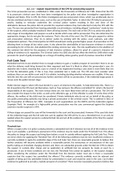Exam (elaborations)
A.C. 2.1 - Explain the requirements of the Crown Prosecutions Service (CPS)
- Course
- Institution
This document has all the notes, which have been marked by my teacher, and they contain the structure as well as all the paragraphs are wrote up for you already, with all the information as well as additional information for higher grades.
[Show more]



